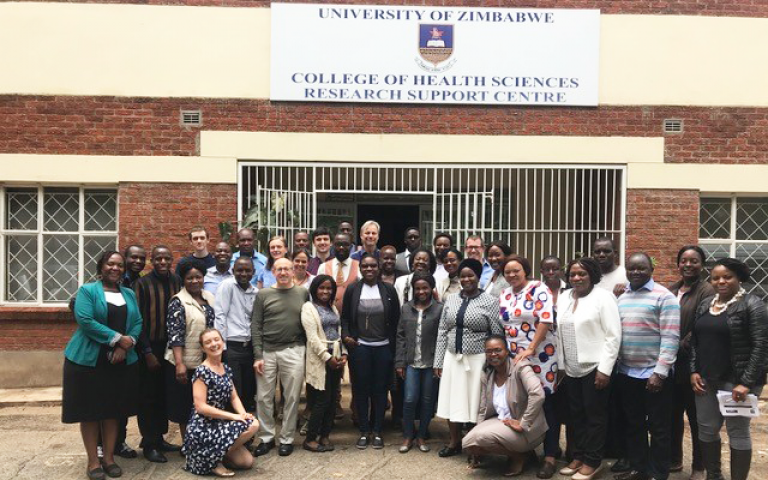Global Engagement Funds Case Study: Dr Felicity Fitzgerald and the University of Zimbabwe
Dr Felicity Fitzgerald used the funds to support a successful workshop on sequencing with colleagues in Zimbabwe

27 February 2019
Dr Felicity Fitzgerald (UCL Institute of Child Health)
Back in April last year, I was lucky enough to sit across a conference lunch table with Dr Justen Manasa from the University of Zimbabwe. I’d just moved to Harare, Zimbabwe to start a lectureship investigating infection control and antimicrobial resistance among children and newborns and was excited to meet someone as dynamic and innovative as Justen.
He was bubbling with ideas and plans for how to stop the flow of samples from Zimbabwe to laboratories elsewhere for sequencing. He is passionately committed not only to increasing the capacity of Zimbabwean laboratories and scientists to handle next generation sequencing, but more importantly to ensuring the Zimbabwean people themselves benefit from this science.
“It is my aim that all Zimbabweans living with HIV should have access to sequencing of their virus and receive appropriate antiretroviral therapy. We must be ambitious,” he said.
Ambitious he is - and energetic! Over that lunch we took our first step towards his eventual goal - that of establishing a sequencing core facility at the University of Zimbabwe. Of course, the first thing you have to demonstrate is how well used the facility would be… and to do that you need local scientists across disciplines to be inspired with ideas and confidence to expand their projects to include sequencing.
The initial idea
We devised the idea of a workshop combining international faculty expertise and local scientists with a commitment to using sequencing in their future projects - with a particular focus on younger post-doctoral scientists and those undertaking or planning their PhDs. “We need to look to the future”, Justen proclaimed. “No old profs in the participants!” (a few were permitted in the faculty).
The first part of the workshop was to be didactic but as interactive as possible, covering a wide range of topics. Our faculty was to be a mix of senior, junior, local and international scientists.
The more senior international/local scientists gave broad overviews of topics such as “Next generation sequencing in HIV resistance tracing” and “immunological sequencing and its clinical context”, while the more junior ones covered individual projects in more depth. In particular, the junior local faculty members gave detailed examples of how they had used sequencing successfully in their PhDs.
The second part of the meeting was the part I was most excited about, as it involved small group workshops that the participants could choose depending on their area of expertise. We had groups focusing on sequencer use in immunology, HIV, global child health, tuberculosis, and the enormously popular ‘How to get your lab sequencer-ready.’ Finally, we had in-depth ‘meet the expert’/grant workshopping sessions.
Securing funding
We developed our concept further, recruiting 17 faculty from the Zimbabwean Ministry of Health and Child Care, the University of Zimbabwe and the Biomedical Research and Training Institute in Zimbabwe, UCL, the University of Oxford, the London School of Hygiene and Tropical Medicine, Great Ormond Street Hospital, Queen Mary University of London, Stanford University, the University of Tampere Finland, the University of Cape Town and the World Health Organisation.
We were then fortunate enough to receive £5,000 from the SFAM International Capacity Building Fund and £2,000 from UCL’s Global Engagement Funds to support the project. Importantly, we were able to offer the workshop to participants for free, to minimise financial bars to entry.
Early career participants
We then threw open the workshop for applications, with the most stringent criteria being around future career potential and commitment to using sequencing techniques in current/upcoming projects.
We were really lucky in attracting 25 incredibly bright, enthusiastic young Zimbabwean scientists/clinicians from a range of backgrounds, including HIV, tuberculosis, human papilloma virus, neonatal sepsis, gut microbiome research, outbreak investigations, typhoid and even an immunologist investigating HLA-typing in lupus.
Again, with my and Justen’s combined optimism and ambition, we decided to spend the first morning taking faculty members on a tour of the laboratories of the participants. We covered a remarkable amount of ground and visited five laboratories before lunch, including the Biomedical Research and Training Institute (where a new molecular facility had just opened), the Infectious Diseases Research Laboratory and the Medical Microbiology Laboratory at the University of Zimbabwe College of Health Sciences.
Impassioned presentation
Ultimately, we had two days of fascinating, engaging talks with wonderful engagement and participation from our audience. Particular high points were a university-wide lecture from Professor Per Ashorn on the impact of laboratory research on World Health Organisation guidelines with reference to the recent MORDOR trial (kindly sponsored by Pulse Pharmaceuticals), and a live demonstration of sequencing alignment from Dr Liam Shaw.
My best moment, though, had to be from Mrs Muchaneta Gudza-Mugabe, a local faculty member presenting her ongoing PhD work at the University of Cape Town on neonatal sepsis outbreak investigation. It was an impassioned, engaging and yet in-depth description of her work that made me want to give a standing ovation - a perfect role model!
 Close
Close

